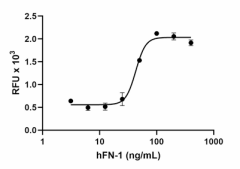- Other Names
- Fibronectin, FN, FN1, Cold-insoluble globulin, CIG, Large external transformation-sensitive protein, LETS
- Ave. Rating
- Submit a Review
- Product Citations
- publications

-

Immobilized GMP recombinant human FN-1 supports the adhesion of mouse L929 cells in a dose dependent manner. The ED50 for this effect is 15 – 60 ng/mL.
| Cat # | Size | Price | Quantity Check Availability | Save | ||
|---|---|---|---|---|---|---|
| 775314 | 25 µg | 196€ | ||||
| 775316 | 100 µg | 636€ | ||||
Fibronectin (FN) is an adhesive glycoprotein found as insoluble components of the extracellular matrix (ECM) or as soluble dimeric forms in plasma. Fibronectin binds chondroitin sulfate, collagen, fibrin, heparin, and many integrin receptors through which it mediates multiple cellular signaling pathways. Conversion of soluble fibronectin to fibronectin fibrils is initiated by binding to cell surface integrins. Fibronectin is involved in cell adhesion, cell motility, wound healing and maintenance of cell morphology. It also participates in osteoblast compaction and is essential for osteoblast mineralization. Fibronectin is thought to play a role in platelet thrombus formation and other diseases associated with thrombosis including atherosclerosis and cardiac repair following a myocardial infarct. Fibronectin plays an important role in coordinating interaction between the ECM and cancer cells in tumors. Its upregulation enhances cancer cell survival, proliferation, and invasion. Fibronectin monomers consist of three types of homologous repeats, type I, II and III domains. A fragment from the first type III repeat, known as Anastellin, binds to fibronectin and induces fibril formation named superfibronectin. Superfibronectin exhibits enhanced adhesive properties and inhibits tumor growth, angiogenesis, and metastasis.
Product DetailsProduct Details
- Source
- Human NF-1, amino acid (Gln32-Pro1991) (Accession: # BC117176) with a C-terminal 8His-GGQ tag was expressed in 293E cells.
- Molecular Mass
- The 1973 amino acid recombinant protein has a predicted molecular mass of approximately 217 kD. The DTT-reduced and non-reduced protein migrates at approximately 180 – 220 kD by SDS-PAGE. The predicted N-terminal amino acid is Gln.
- Purity
- > 95%, as determined by Coomassie stained SDS-PAGE.
- Formulation
- 0.1 µm filtered protein solution is in PBS, pH 7.2.
- Endotoxin Level
- Less than 0.1 EU per µg of protein as determined by the LAL method.
- Concentration
- 0.5 mg/mL
- Storage & Handling
- Unopened vial can be stored between 2°C and 8°C for up to 2 weeks, at -20°C for up to six months, or at -70°C or colder until the expiration date. For maximum results, quick spin vial prior to opening. The protein can be aliquoted and stored at -20°C or colder. Stock solutions can also be prepared at 50 - 100 µg/mL in appropriate sterile buffer, carrier protein such as 0.2 - 1% endotoxin-free BSA or HSA can be added when preparing the stock solution. Aliquots can be stored between 2°C and 8°C for up to one week or stored at -20°C or colder for up to 3 months. Avoid repeated freeze/thaw cycles.
- Activity
- Immobilized recombinant human FN-1 supports the adhesion of mouse L929 cells in a dose dependent manner. The ED50 for this effect is 15 – 60 ng/mL.
- Application
-
Bioassay
Cell Culture - Application Notes
-
BioLegend carrier-free recombinant proteins provided in liquid format are shipped on blue ice. Our comparison testing data indicates that when handled and stored as recommended, the liquid format has equal or better stability and shelf-life compared to commercially available lyophilized proteins after reconstitution. Our liquid proteins are verified in-house to maintain activity after shipping on blue ice and are backed by our 100% satisfaction guarantee. If you have any concerns, contact us at tech@biolegend.com.
- Disclaimer
-
GMP Recombinant Proteins. BioLegend GMP recombinant proteins are manufactured in a dedicated GMP facility and compliant with ISO 13485:2016. For research or ex vivo cell processing use. Not for use in diagnostic or therapeutic procedures. Our processes include:
- Batch-to-batch consistency
- Material traceability
- Documented procedures
- Documented employee training
- Equipment maintenance and monitoring records
- Lot-specific certificates of analysis
- Quality audits per ISO 13485:2016
- QA review of released products
BioLegend GMP recombinant proteins are manufactured and tested in accordance with USP Chapter 1043, Ancillary Materials for Cell, Gene and Tissue-Engineered Products and Ph. Eur. Chapter 5.2.12.
Antigen Details
- Structure
- Monomer
- Distribution
-
Plasma FN (soluble dimeric form) is secreted by hepatocytes. Cellular FN (dimeric or cross-linked multimeric forms), made by fibroblasts, epithelial, and other cell types, is deposited as fibrils in the extracellular matrix.
- Function
- Fibronectins bind cell surfaces and various compounds including collagen, fibrin, heparin, DNA, and actin
- Interaction
- Cell surface, collagen, fibrin, heparin, DNA, and actin
- Ligand/Receptor
- Integrins α5β1, α4β1, α4β7, α9β1, αvβ3; non-integrin receptors TLR-4, CD44, Syndecan-4, collagen, fibrin, heparin, DNA, and actin
- Bioactivity
- FN-1 supports the adhesion of mouse L929 cells.
- Biology Area
- Angiogenesis, Cancer Biomarkers, Cell Biology, Cell Motility/Cytoskeleton/Structure, Neuroscience Cell Markers
- Antigen References
-
- Schwarz-Linek U, et al. 2004. Mol Microbiol. 52:631.
- Nagai Y, et al. 2006. Immunity. 24:801.
- White ES, et al. 2008. J. Pathol. 216:1.
- Adams JC, et al. 2015. Cell Adh Migr. 9:22.
- Kraft S, et al. 2016. J. Mol. Med. 94:567.
- Speziale P, et al. 2019. Cells. 8:1516.
- Wirth F, et al. 2020. Cells. 9:2717.
- Gene ID
- 2335 View all products for this Gene ID
- UniProt
- View information about FN-1 on UniProt.org
 Login / Register
Login / Register 













Follow Us